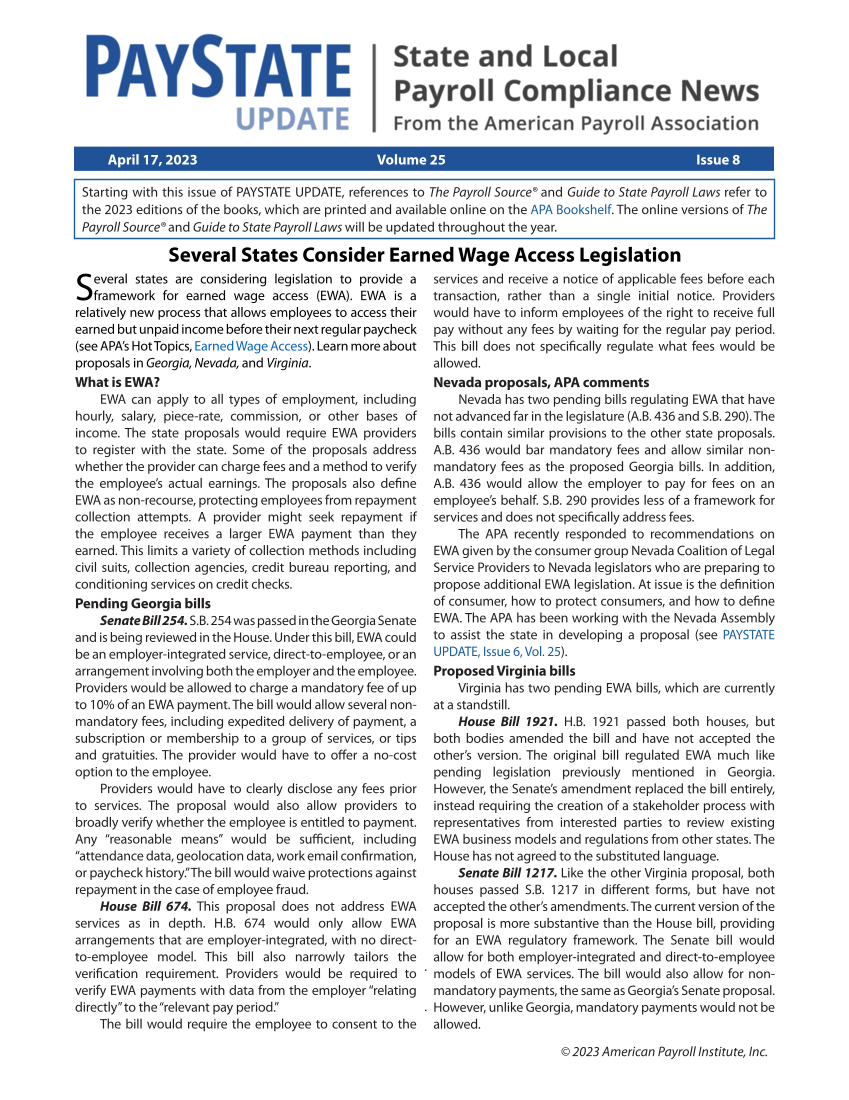© 2023 American Payroll Institute, Inc. Several States Consider Earned Wage Access Legislation Several states are considering legislation to provide a framework for earned wage access (EWA). EWA is a relatively new process that allows employees to access their earned but unpaid income before their next regular paycheck (see APA’s Hot Topics, Earned Wage Access). Learn more about proposals in Georgia, Nevada, and Virginia. What is EWA? EWA can apply to all types of employment, including hourly, salary, piece-rate, commission, or other bases of income. The state proposals would require EWA providers to register with the state. Some of the proposals address whether the provider can charge fees and a method to verify the employee’s actual earnings. The proposals also define EWA as non-recourse, protecting employees from repayment collection attempts. A provider might seek repayment if the employee receives a larger EWA payment than they earned. This limits a variety of collection methods including civil suits, collection agencies, credit bureau reporting, and conditioning services on credit checks. Pending Georgia bills Senate Bill 254. S.B. 254 was passed in the Georgia Senate and is being reviewed in the House. Under this bill, EWA could be an employer-integrated service, direct-to-employee, or an arrangement involving both the employer and the employee. Providers would be allowed to charge a mandatory fee of up to 10% of an EWA payment. The bill would allow several non- mandatory fees, including expedited delivery of payment, a subscription or membership to a group of services, or tips and gratuities. The provider would have to offer a no-cost option to the employee. Providers would have to clearly disclose any fees prior to services. The proposal would also allow providers to broadly verify whether the employee is entitled to payment. Any “reasonable means” would be sufficient, including “attendance data, geolocation data, work email confirmation, or paycheck history.” The bill would waive protections against repayment in the case of employee fraud. House Bill 674. This proposal does not address EWA services as in depth. H.B. 674 would only allow EWA arrangements that are employer-integrated, with no direct- to-employee model. This bill also narrowly tailors the verification requirement. Providers would be required to verify EWA payments with data from the employer “relating directly” to the “relevant pay period.” The bill would require the employee to consent to the services and receive a notice of applicable fees before each transaction, rather than a single initial notice. Providers would have to inform employees of the right to receive full pay without any fees by waiting for the regular pay period. This bill does not specifically regulate what fees would be allowed. Nevada proposals, APA comments Nevada has two pending bills regulating EWA that have not advanced far in the legislature (A.B. 436 and S.B. 290). The bills contain similar provisions to the other state proposals. A.B. 436 would bar mandatory fees and allow similar non- mandatory fees as the proposed Georgia bills. In addition, A.B. 436 would allow the employer to pay for fees on an employee’s behalf. S.B. 290 provides less of a framework for services and does not specifically address fees. The APA recently responded to recommendations on EWA given by the consumer group Nevada Coalition of Legal Service Providers to Nevada legislators who are preparing to propose additional EWA legislation. At issue is the definition of consumer, how to protect consumers, and how to define EWA. The APA has been working with the Nevada Assembly to assist the state in developing a proposal (see PAYSTATE UPDATE, Issue 6, Vol. 25). Proposed Virginia bills Virginia has two pending EWA bills, which are currently at a standstill. House Bill 1921. H.B. 1921 passed both houses, but both bodies amended the bill and have not accepted the other’s version. The original bill regulated EWA much like pending legislation previously mentioned in Georgia. However, the Senate’s amendment replaced the bill entirely, instead requiring the creation of a stakeholder process with representatives from interested parties to review existing EWA business models and regulations from other states. The House has not agreed to the substituted language. Senate Bill 1217. Like the other Virginia proposal, both houses passed S.B. 1217 in different forms, but have not accepted the other’s amendments. The current version of the proposal is more substantive than the House bill, providing for an EWA regulatory framework. The Senate bill would allow for both employer-integrated and direct-to-employee models of EWA services. The bill would also allow for non- mandatory payments, the same as Georgia’s Senate proposal. However, unlike Georgia, mandatory payments would not be allowed. April 17, 2023 Volume 25 Issue 8 Starting with this issue of PAYSTATE UPDATE, references to The Payroll Source® and Guide to State Payroll Laws refer to the 2023 editions of the books, which are printed and available online on the APA Bookshelf. The online versions of The Payroll Source® and Guide to State Payroll Laws will be updated throughout the year.
Printed for: PayrollOrg Bookshelf © 2024 American Payroll Institute, Inc. All Rights reserved. From: PayrollOrg Digital Publications (bookshelf.payroll.org)






